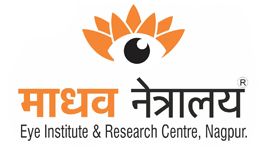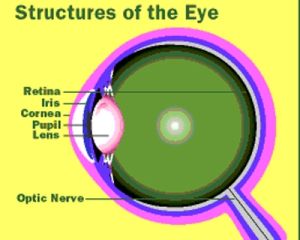The Department of Cataract Surgery at Madhav Netralaya carries out most of the Cataract surgeries which are painless, suture less, blood less and the best part is our patients can see immediately after the operation.
What is a Cataract?
A Cataract is a clouding of the lens in the eye and its capsule. ( A lens is a transparent structure in the eye that helps to focus on light, or an image on the retina. In case of Cataract the lens become cloudy so the image formed becomes blurred). Development of Cataract is a normal ageing process. Cataracts are very common in older people. By the age of 70, most of us will need a Cataract surgery. Moreover a Cataract can occur in either or both eyes.
The causes of cataract-
The lens is made of water and protein. The proteins are arranged in a particular way to pass the light rays through the lens and to keep the lens transparent. But as we age, some of the proteins may clump together and lose its transparency. This is called as a cataract. With time, the cataract may grow larger and denser, making it harder to see. There are many other causes of cataract like trauma, drug induced, and any inflammation in the eye can cause cataract; cataract can be associated with many syndromes also.
Symptoms of a cataract-
The most common symptoms of a cataract are:
- Cloudy or blurry vision mostly at distance. Near vision may remain normal.
- Colors seem faded.
- Glare. Headlights, lamps, or sunlight may appear too bright. A halo may appear around lights.
- Poor night vision.
- Double vision or multiple images in one eye. (This symptom may clear as the cataract gets larger.)
- Frequent prescription changes in your eyeglasses or contact lenses.
These symptoms also can be a sign of other eye problems. If you have any of these symptoms, check with the top eye specialist in Nagpur.
Tests needed to be underwent for cataract-
You must visit an eye doctor if you have any symptoms of blurred vision or decreased vision. Madhav Netralaya has trained ophthalmologists who will examine your eyes in detail for further procedure.
Cataract is detected through a comprehensive eye exam that includes:
- Visual acuity test. This eye chart test measures how well you see at various distances.
- Dilated eye exam. Drops are placed in your eyes to widen, or dilate the pupils. Your eye care professional uses a special magnifying lens to examine your retina and optic nerve for signs of damage and other eye problems. After the exam, your close-up vision may remain blurred for several hours.
- An instrument measures the pressure inside the eye. Numbing drops may be applied to your eye for this test.
Your eye care professional also may do other tests to learn more about the structure and health of your eye.
The treatment to be undergone-
The symptoms of early cataract may be improved with new eyeglasses, brighter lighting, anti-glare sunglasses, or magnifying lenses. If these measures do not help, surgery is the only effective treatment. Surgery involves removing the cloudy lens and replacing it with an artificial lens.
A cataract needs to be removed only when vision loss interferes with your everyday activities, such as driving, reading, or watching TV. You and your eye care professional can make this decision together. Once you understand the benefits and risks of surgery, you can make an informed decision about whether cataract surgery is right for you or not.
Your health care professional will guide you regarding the investigations required before the cataract surgery. One should also get a physical check up done before the surgery with your physician. If you have cataracts in both eyes that require surgery, the surgery will be performed on each eye at separate times.
The risk factors of cataract surgery-
As with any surgery, cataract surgery poses risks, such as infection. Mostly cataract operation is a bloodless surgery but very rarely bleeding can happen during operation. Before cataract surgery, your doctor may ask you to temporarily stop taking certain medications that increase the risk of bleeding during surgery. After surgery, you must keep your eye clean, wash your hands before touching your eye, and use the prescribed medications to help minimize the risk of infection. Serious infection can result in loss of vision.
Cataract surgery slightly increases your risk of retinal detachment. Other eye disorders, such as high myopia (nearsightedness), can further increase your risk of retinal detachment after cataract surgery. One sign of a retinal detachment is a sudden decrease in vision or flashes or floaters. Floaters are little “cobwebs” or specks that seem to float about in your field of vision. If you notice a sudden increase in floaters or flashes, see an eye care professional immediately. A retinal detachment is a medical emergency. If necessary, go to an emergency service or hospital. Your eye must be examined by an eye surgeon as soon as possible. A retinal detachment causes no pain. Early treatment for retinal detachment often can prevent permanent loss of vision. The sooner you get treatment, the more likely you will regain good vision. Even if you are treated promptly, some vision may be lost.Talk to your eye care professional about these risks. Make sure cataract surgery is right for you.
Our facilities:
Madhav Netralaya is well equipped for the latest technology to operate cataract. We have a femtosecond laser assisted cataract surgery (FLACS), which is the best technology only available at Madhav Netralaya in central India.
This is a blade-less technology which gives perfect results and safest of all surgeries. We have high end equipments for the perfect measurements of eyes for accurate intraocular lens power calculations and latest machines for phaco emulsifications.
Our surgeons are well trained from premium institutes; experienced and excellent in cataract surgery. Most of the surgeries are performed under topical anesthesia. At Madhav Netralaya most of the cataract surgeries are painless, suture less, blood less and patients can see immediately after operations. So if you have any enquiry related to cataract surgery contact us at [email protected] or call us on +91 7122253233, +91 7126785200.




